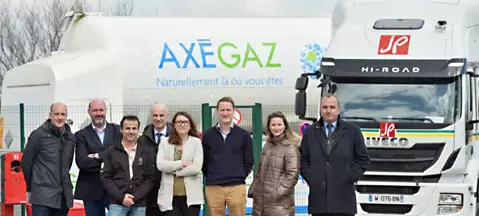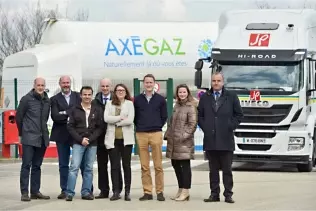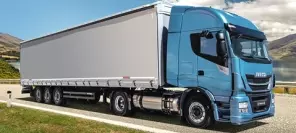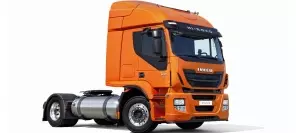- Main page
- Search
- Up to date
- Products
- Technology
- Vehicles
- Video
- Conversion Payback Simulator
Port Injection - Conversion Payback Simulator
Direct Injection - Conversion Payback Simulator
Diesel - Newsletter
Stralis LNG versus diesel - test results
 loading results...
loading results...The test was conducted with two Iveco Stralis Euro 6 truck tractors – one diesel-powered and the other running on natural gas. The oil burner offered 460 PS of power, while the Stralis Natural Power LNG's unit generated 330 PS. The test was commissioned by Easydis, a Cassino company, and carried out with the assistance from transport operator Jacky Perrenot – the first French company ever to buy a fleet of methane-powered Stralises (10 vehicles). Exhaust gas emissions were tested between January 26 and 30, 2015.
Both trucks ran in distribution transport conditions on routes ranging from 50 to 110 km, with trailers loaded with 26 tonnes of cargo, as well as in highway driving along 240-km-long routes, with the same kind of load. The results? Carbon dioxide emissions were considerably lower for the natural gas-powered vehicle than for the one running on diesel fuel. How much lower exactly? Depending on the type of route, CO2 emissions dropped by 4 to 16 percent. On average, the NGV emitted by 10 percent less greenhouse gas than the diesel one. The higher the average speed was, the more efficient the LNG variant proved.
As far as nitrogen oxides are concerned, the difference in favour of the methane-powered Stralis was even greater. Depending on the route, the LNG version reduced NOX emissions by 30 to 70 percent. In this case, the more stops there were along the route, the higher the reduction was. This means the Stralis CNG/LNG could prove particularly efficient in urban driving, contributing less to deterioration of city air quality. Last but not least, natural gas is by up to 40 percent cheaper than diesel, so Stralis LNG's higher price could be compensated within 3 to 4 years, depending on annual mileage.
Particulate matter emissions were so low that specialised machinery couldn't detect it at all. This result is exactly what we expect of NGVs, however. Powering engines with natural gas eliminates the need to use any particulate filters, which means there is no necessity to maintain or regenerate it across the vehicle's entire technological life.
Clément Chandon, Iveco
It's worth pointing out that methane-powered engines emit even less CO2 when they use biomethane (produced through fermentation of biomass in the absence of oxygen) instead of fossil natural gas. Also, engines running on gaseous fuels produce by half less noise, which proves particularly beneficial in urban conditions (night-time or early-morning deliveries or garbage collection).
Natural gas-based propulsion is the most efficient of the easily accessible technologies allowing to tackle road transport's environmental issues. It improves urban air quality by remarkably reducing GHG emissions.
Clément Chandon, Iveco








